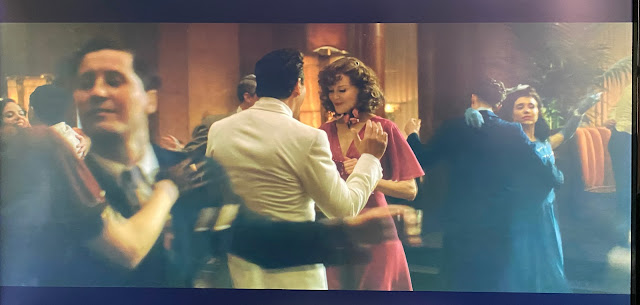Being the Ricardos suffers from a few things. The first being the curse of being pushed forward by the children of the subjects, who of course, always want to portray their parents as wonderful people, which detracts from a good story, and sometimes, from the truth. The other major thing is this: I really hate multihyphenates. In my experience, especially at top levels of show biz, you’re lucky if you do one thing really well. It’s truly a rare person who does even two things extremely well, and anyone who tries to do five things well is just fooling themselves about the depths of their talents.
Aaron Sorkin (Being the Ricardos’ writer/director) is a brilliant playwright. Truly brilliant, one of the best wordsmiths around. On a stage. He propelled that skill into television, which, after all, started out as staged plays for a larger audience. The West Wing was brilliant TV. But, for my money, his films have not at all worked. Especially the ones he directed.
MAJOR SPOILERS AHEAD. You’ve been warned….
So, let’s take this one. Being the Ricardos is essentially a great stage play. The devices that work in the film are stage devices. Let’s start with the first, most obvious, problem. Lucy (our beloved Lucy from I Love Lucy) isn’t funny. On a stage, that deviation would work. Not so much in a film.
Sorkin hangs the entire film on two things: that Lucy was a Commie (which she wasn’t) and that Desi was a philanderer (which he may or may not have been). Neither works.
But let’s start at the beginning, with an overused TV and film device (the first time I saw it was in Warren Beatty’s Reds), the characters talking back to the screen, being interviewed. Except in this, we get a bastardization (which, again, would be great on a stage, doesn’t work in a film). We get three “old” folks, who aren’t really the real folks, acting as if they are the real folks. (I pretty much hated this movie from this opening.) So they tell us the details of what happened on this eventful week. Except once it’s described, it isn’t really that eventful. They describe it as… “we could be finished…” and maybe that’s true, but the movie also shows the ephemera of show biz, where, for example, Lucy loses her contract with RKO and bounces back by working in radio. AKA, it might SEEM like the end of the world, but it probably isn’t.
Then we go back to the actual week, with younger, different actors as the ones we just saw. I don’t want to go back to the trope that Sorkin can’t write female roles, but he really can’t. His gamut of female is bitch or harlot. So, Lucy is a bitch. Not funny at all. Cold, manipulative. #GoodTimes
Now, maybe Lucille Ball was this way. She was certainly more businesslike behind the scenes than people gave her credit for. But there was no balance. (We didn’t see her playing cards at all.) And again, we didn’t see the funny. Not once in the entire movie. There were some small recreations of scenes (in black and white), but nothing which evoked a laugh. Not even a giggle.
The other woman, Vivian Vance, was painted as someone who lost a bunch of weight and was chastised for it. Essentially, “we hired you to be fat, deal with it.” Maybe that was true. But it doesn’t ring true in this movie.
Also, J.K. Simmons, who does a wonderful Fred Mertz, and a passable William Frawley, makes his dislike of his costar known, in a move that would be called a toxic work environment on today’s sets. And OK, maybe that is how it was then.
But it brings up: why are we telling this story? Why do we care?
The whole “Lucy is a Commie” thing isn’t anything to hang a movie on. And the other revelation is one part of the movie which really didn’t work for me. Don’t get me wrong: Javier Bardem is luminous as Desi. He pounds those bongos and exhibits that sexy Latin swagger all over the place. But he telegraphs “married man” through the whole movie. The movie is about that he’s actually a philanderer, and in the moments when he could show that sexual animal stuff, he doesn’t. That’s really pretty key.
Nicole Kidman is a fabulous actress. When she was cast, I remember thinking: Nicole Kidman as Lucille Ball? HUH? When Debra Messing is right here? (Debra Messing telegraphs “funny” just by standing in place. You kinda needed that in this movie.)
But Kidman does what Sorkin asks of her. She is Lucy as boss bitch, not so much the funny woman. There is a tremendous scene (the key moment of the film) that she does with Bardem, that she nails. Absolute artistry. In that moment, Bardem doesn’t deliver equally, which destroyed the film for me.
The other problem with this film is that the audience (by and large) doesn’t dig the “inside baseball” thing of show business. Especially when you’re talking about how things worked on a show in the Fifties. Who cares that she was once briefly called a Commie? When she clearly wasn’t? Or that they didn’t like women talking about being pregnant?
The film doesn’t give you anything that you loved about watching I Love Lucy, if you did. Doesn’t even give you anything that you loved about Lucille Ball, if you loved her career.
Oh! But, one thing I really did enjoy… they go to Ciro’s to “learn rumba.” Among the dancers are three of our favorites from #DancingWithTheStars: Valentin Chmerkovskiyy, Jenna Johnson and Britt Stewart. That was wondrous.
My thesis? Brilliant playwrights should just make great plays, and not try to make great films. It’s not the same thing. And this film failed on every level. Sadly.
************************************************************

